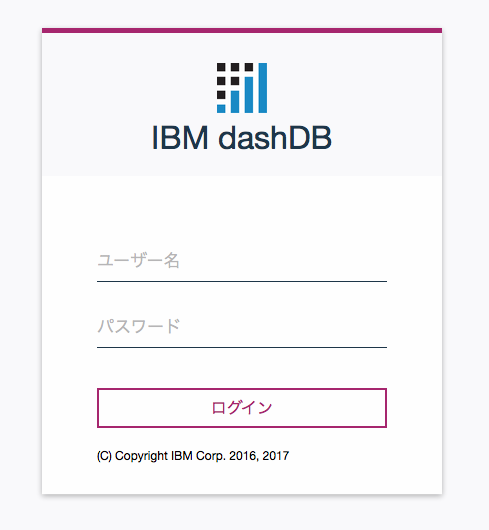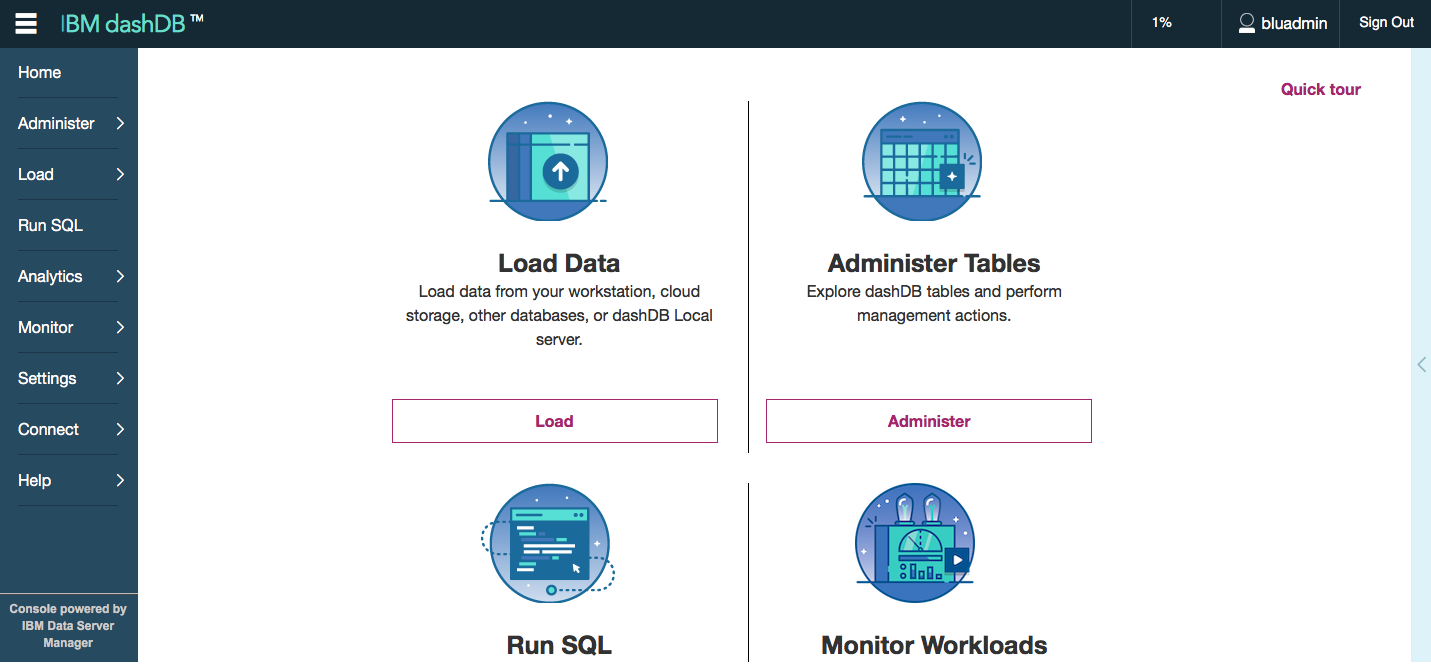Bluemix等で利用できる、このQiitaにも幾つかメモしたdashDBですが「dashDB Local」というものがあるようで試してみました
https://www.ibm.com/analytics/jp/ja/technology/cloud-data-services/dashdb-local/
いわゆるマネージド・サービスではなくてソフトウェアのようにdashDBを使えるのがdashDB Localのようです(「ソフトウェアアプライアンス」と言うらしい)
操作にあたり、参考にしたページはこちらのマニュアル
ざっくり手順を紹介すると
- Free Trialの登録
- Linux準備(今回はCentOS)
- Dockerインストール
- dashDB Localインストール(Dockerコンテナをダウンロード&run)
これだけです![]()
Free Trialの登録
ここを見る。
加えて、 dokcer hubのIDも必要です。
CentOS 準備
ホスト名設定の確認
/etc/hostsでホスト名が設定されているかを確認。設定されてない場合は、適宜行追加。
$ cat /etc/hosts
127.0.0.1 localhost.localdomain localhost
169.53.15.170 dashLocal
SELinuxの設定確認
以下のように、SELINUX=permissiveとなってることを確認
# vi /etc/selinux/config
# This file controls the state of SELinux on the system.
# SELINUX= can take one of these three values:
# enforcing - SELinux security policy is enforced.
# permissive - SELinux prints warnings instead of enforcing.
# disabled - No SELinux policy is loaded.
SELINUX=permissive
IP転送がONになってることを確認する
1が帰ってくればOK。帰ってこなければ要設定。
# /sbin/sysctl net.ipv4.ip_forward
net.ipv4.ip_forward = 1
dashDB Local用にファイルシステムを作成する
# fdisk /dev/xvdc
〜中略〜
コマンド (m でヘルプ): n
Partition type:
p primary (0 primary, 0 extended, 4 free)
e extended
Select (default p): p
パーティション番号 (1-4, default 1): 1
最初 sector (2048-1048575999, 初期値 2048):
初期値 2048 を使います
Last sector, +sectors or +size{K,M,G} (2048-1048575999, 初期値 1048575999):
初期値 1048575999 を使います
Partition 1 of type Linux and of size 500 GiB is set
コマンド (m でヘルプ): w
パーティションテーブルは変更されました!
このあと、OS rebootして設定を反映させてからファイルシステム作成し、マウント
# mkfs.xfs -d su=256k,sw=4 /dev/xvdc1
meta-data=/dev/xvdc1 isize=512 agcount=16, agsize=8191936 blks
= sectsz=512 attr=2, projid32bit=1
= crc=1 finobt=0, sparse=0
data = bsize=4096 blocks=131070976, imaxpct=25
= sunit=64 swidth=256 blks
naming =version 2 bsize=4096 ascii-ci=0 ftype=1
log =internal log bsize=4096 blocks=64000, version=2
= sectsz=512 sunit=64 blks, lazy-count=1
realtime =none extsz=4096 blocks=0, rtextents=0
# mkdir /mnt/clusterfs
# mount /dev/xvdc1 /mnt/clusterfs
# df -h
ファイルシス サイズ 使用 残り 使用% マウント位置
/dev/xvda2 99G 1.4G 92G 2% /
devtmpfs 7.8G 0 7.8G 0% /dev
tmpfs 7.7G 0 7.7G 0% /dev/shm
tmpfs 7.7G 8.4M 7.7G 1% /run
tmpfs 7.7G 0 7.7G 0% /sys/fs/cgroup
/dev/xvda1 240M 159M 69M 70% /boot
tmpfs 1.6G 0 1.6G 0% /run/user/1000
/dev/xvdc1 500G 33M 500G 1% /mnt/clusterfs
最終行に、/mnt/clusterfsが出来ています。よしよし。
Dockerインストール
マニュアルに書いてある通り、インストール
...どうやらバージョンが指定のようです。
# yum-config-manager --add-repo https://docs.docker.com/v1.13/engine/installation/linux/repo_files/centos/docker.repo
# yum makecache fast
# yum -y install docker-engine-1.12.6-1.el7.centos
# systemctl start docker
# systemctl enable docker
以上で、OS側のセットアップ完了です。ではいよいよ、dashDB Local側にはいっていきます。
dashDB Local インストール
Docker HUBにログインします。冒頭で登録したTrialのユーザです。
#docker login -u=docker_hub_id -p='password'
dashDBのコンテナを落として、インストールします。
その様子をlogs --followで追ってみます。どんな設定をしたりとか、エラーが出た場合は何でエラーがでているかなどがわかって便利です(ところどころ中略しています)
# docker run -d -it --privileged=true --net=host --name=dashDB -v /mnt/clusterfs:/mnt/bludata0 -v /mnt/clusterfs:/mnt/blumeta0 ibmdashdb/local:latest-linux
# docker logs --follow dashDB
systemd 219 running in system mode. (+PAM +AUDIT +SELINUX +IMA -APPARMOR +SMACK +SYSVINIT +UTMP +LIBCRYPTSETUP +GCRYPT +GNUTLS +ACL +XZ -LZ4 -SECCOMP +BLKID +ELFUTILS +KMOD +IDN)
Detected virtualization docker.
Detected architecture x86-64.
Welcome to dashDB Local!
Set hostname to <ynats0602010319.demos.demoibm.com>.
Initializing machine ID from random generator.
Cannot add dependency job for unit systemd-tmpfiles-clean.timer, ignoring: Unit is masked.
[ OK ] Reached target Local File Systems.
[ OK ] Reached target Timers.
[ OK ] Reached target Swap.
[ OK ] Reached target Paths.
[ OK ] Created slice Root Slice.
[ 505.879243] start_dashDB_local.sh[148]: Container Tests Summary
[ 505.881775] start_dashDB_local.sh[148]: +--------------------------------+----------------------+
[ 505.882033] start_dashDB_local.sh[148]: | Test | Result |
[ 505.882229] start_dashDB_local.sh[148]: +--------------------------------+----------------------+
[ 505.882417] start_dashDB_local.sh[148]: | Minimum data volume free-space | PASS |
[ 505.882604] start_dashDB_local.sh[148]: | Minimum memory | PASS |
[ 505.882790] start_dashDB_local.sh[148]: | Minimum number of CPU cores | PASS |
[ 505.882980] start_dashDB_local.sh[148]: | Port availability | PASS |
[ 505.883191] start_dashDB_local.sh[148]: | Port accessibility | PASS |
[ 505.883375] start_dashDB_local.sh[148]: | Data volume direct I/O | PASS |
[ 505.883559] start_dashDB_local.sh[148]: | Data volume read/write speed | 68.5 MB/s, 10.9 MB/s |
[ 505.883741] start_dashDB_local.sh[148]: +--------------------------------+----------------------+
[ 509.492217] start_dashDB_local.sh[148]: Creating dashDB directories and dashDB instance
[ 1545.408941] start_dashDB_local.sh[148]: ################################################################################
[ 1545.409242] start_dashDB_local.sh[148]: ### Starting all the services in the dashDB stack ###
[ 1545.409443] start_dashDB_local.sh[148]: ################################################################################
[ 1545.409633] start_dashDB_local.sh[148]: * If this is a new deployment, the dashDB stack is initialized, which might
[ 1545.409827] start_dashDB_local.sh[148]: take a while.
[ 1545.410037] start_dashDB_local.sh[148]: * If this is a container update, it might take a while to start the services,
[ 1545.410236] start_dashDB_local.sh[148]: depending on whether a dashDB engine or database update is required.
[ 1545.871495] start_dashDB_local.sh[148]: ********************** dashDB Local license information ************************
[ 1545.874837] start_dashDB_local.sh[148]: * License type : Trial
[ 1545.878250] start_dashDB_local.sh[148]: * License expiry date : 09/01/2017
[ 1545.881802] start_dashDB_local.sh[148]: * Number of days remaining : 89
[ 1545.885178] start_dashDB_local.sh[148]: * License status : Active
[ 1545.888188] start_dashDB_local.sh[148]: ********************************************************************************
[ 1580.465106] start_dashDB_local.sh[148]: dashDB instance will use up to 70% of the total memory.
[ 1613.688066] start_dashDB_local.sh[148]: Running AUTOCONFIGURE to tune dashDB database ...
[ 1623.248191] start_dashDB_local.sh[148]: Spark memory will use up to 10% of the total memory.
[ 1699.525821] start_dashDB_local.sh[148]: Updating dashDB database log file configuration
[ 1731.728261] start_dashDB_local.sh[148]: Run hardware inventory collection
[ 1732.187798] start_dashDB_local.sh[148]: +----------------+------------+----------------+-------------+
[ 1732.188236] start_dashDB_local.sh[148]: | | # of nodes | # of CPU cores | Memory (MB) |
[ 1732.188440] start_dashDB_local.sh[148]: +----------------+------------+----------------+-------------+
[ 1732.188636] start_dashDB_local.sh[148]: | Current | 1 | 4 | 15629 |
[ 1732.188834] start_dashDB_local.sh[148]: | Max this month | 1 | 4 | 15629 |
[ 1732.189059] start_dashDB_local.sh[148]: | Max last month | -- | -- | -- |
[ 1732.189250] start_dashDB_local.sh[148]: | Max all time | 1 | 4 | 15629 |
[ 1732.189433] start_dashDB_local.sh[148]: +----------------+------------+----------------+-------------+
[ 1936.253072] start_dashDB_local.sh[148]: ###########################################################################
[ 1936.256215] start_dashDB_local.sh[148]: ##### --- dashDB stack service status summary --- #####
[ 1936.259292] start_dashDB_local.sh[148]: ###########################################################################
[ 1940.421875] start_dashDB_local.sh[148]: Redirecting to /bin/systemctl status slapd.service
[ 1940.422195] start_dashDB_local.sh[148]: SUMMARY
[ 1940.422431] start_dashDB_local.sh[148]: LDAPrunning : SUCCESS
[ 1940.422650] start_dashDB_local.sh[148]: dashDBtablesOnline : SUCCESS
[ 1940.422847] start_dashDB_local.sh[148]: WebConsole : SUCCESS
[ 1940.423062] start_dashDB_local.sh[148]: dashDBconnectivity : SUCCESS
[ 1940.423264] start_dashDB_local.sh[148]: dashDBrunning : SUCCESS
[ 1940.427368] start_dashDB_local.sh[148]: ***********************************************************
[ 1940.430783] start_dashDB_local.sh[148]: ******* Congratulations! **********
[ 1940.433617] start_dashDB_local.sh[148]: ** You have successfully deployed dashDB **
[ 1940.436857] start_dashDB_local.sh[148]: ***********************************************************
[ 1940.439505] start_dashDB_local.sh[148]: *
[ 1940.442282] start_dashDB_local.sh[148]: * Next steps:
[ 1940.445122] start_dashDB_local.sh[148]: *
[ 1940.598153] start_dashDB_local.sh[148]: * 1. If you were monitoring dashDB Local container startup progress using docker logs
[ 1940.601116] start_dashDB_local.sh[148]: command, use Ctrl+c key-sequence to detach from the Docker logs console.
[ 1940.604197] start_dashDB_local.sh[148]: * 2. Log in to the web console using the following information:
[ 1940.607043] start_dashDB_local.sh[148]: * URL: https://169.53.15.170:8443
[ 1943.212686] start_dashDB_local.sh[148]: * Default user ID : bluadmin
[ 1943.213059] start_dashDB_local.sh[148]: * Default password : xxxxxxx
[ 1943.218720] start_dashDB_local.sh[148]: * 3. For improved security, change the default bluadmin password
[ 1943.221797] start_dashDB_local.sh[148]: * by running "docker exec -it dashDB setpass <new password>". Other user management
[ 1943.224819] start_dashDB_local.sh[148]: * should be done via the web console.
[ 1943.227895] start_dashDB_local.sh[148]: *
[ 1943.231064] start_dashDB_local.sh[148]: ***********************************************************
最後にURL、ユーザ名、パスワードが出ています。このままでも良いのですが、到底覚えられ無さそうなパスワードなので、せっっかくなので変更してみます。
# docker exec -it dashDB setpass xxxxxxx
では稼働確認!
稼働確認
できあがり!
おまけ
(MacとかWindowsでもDocker tools?使えばできるみたいなので、また今度試してみようかな..)

